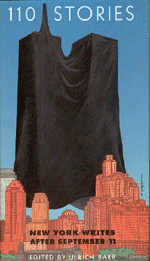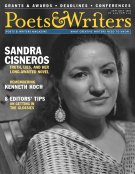Over three hundred poems, short stories, and essays written in response to the events of last September have been collected in three new anthologies. September 11, 2001: American Writers Respond, edited by William Heyen, was published by Etruscan Press in July; Poetry After 9/11: An Anthology of New York Poets, edited by Dennis Loy Johnson and Valerie Merians, was published by Melville House on September 1; and 110 Stories: New York Writes After September 11, edited by Ulrich Baer, will be published by New York University Press on September 11.

Although many nonfiction books commemorating the victims and commenting on the events of September 11 have been published throughout the past year, the new anthologies offer a look at how creative writers from New York and across America responded to the solemn truth that, as Vivian Gornick writes in 110 Stories, "our world had changed and—New York would never be the same."
The writers assembled in the three anthologies cover multiple genres, geographic boundaries, political ideologies, and creative aesthetics, providing a multifarious sampling of the state of American writing. Among the three books there are 272 contributors whose responses to the attacks range from Jonathan Ames's bracing observations of an all-girls college tennis team to a poem by Eliot Katz that dovetails grisly images with a strident political invective.
Responding to the abundance of spontaneous poems that could be seen everywhere in New York City after the attacks—as posters, impromptu memorials, graffiti, and e-mails—editors Johnson and Merians asked Pulitzer Prize–winning poet Stephen Dunn to be the first contributor to Poetry After 9/11. After Dunn's immediate, enthusiastic response, and as word of their project spread, they received submissions—many unsolicited, ranging from book-length manuscripts to just a few poems—from over 250 poets, and selected the work of 45 for the book.
"Most anthologies are centered around some kind of genre," Johnson says. "This instead is focused on writers in the immediate New York City vicinity in a very short period of time. It's a very unique survey of the American poetry capital at a very specific time." Sales from the book will support future publications out of Melville House, a new small press in Hoboken, New Jersey.
September 11, 2001: American Writers Respond nearly didn't happen. Heyen, a writer and editor of two previous literary anthologies, had serious reservations about the book the day after pro- posing it to Etruscan Press. "I thought that maybe it wasn't viable," Heyen says. "Topical and creative writing have always been at odds with one another. People want to have some Wordsworthian distance, emotion recollected in tranquillity." He withdrew his proposal, but pushed on after receiving encouragement from individuals at the press. The result is a collection of poems, reflections, mini-memoirs, and essays charting the "wildness" that Emerson required of the American writer.
"I was just looking for something that I hadn't heard before," Heyen says, "something that revealed our psychic disequilibrium at this time, even if the writer didn't know that he or she was doing that." Even before the anthology's publication on July 31, Etruscan Press ordered a second printing of 3,500 copies, an increase over the initial run of 2,500. After recouping its initial investment, Etruscan will donate sales of the anthology to the Families of Freedom Fund.
Baer says he collected the work in 110 Stories to fill the gap between personal and political responses to the terrorist attacks. "I was very frustrated by not having a text to read or some kind of explanation that would capture the emotional intensity of the event and also the political dimension; it was either one or the other." Baer's requirement for inclusion in the anthology—aside from literary merit—was simple: To be in the book writers had to have been in New York City on the day of the attacks.
"I wanted some personal pieces to ground the book thematically," Baer says. "But I really wanted to avoid a hundred and ten eyewitness testimonies. I can't read them anymore. I don't think anybody can and anybody should; it seems too overwhelming and too sad. So I really discouraged people from writing their own personal story, what I call 'my own private 9/11.'" Any profits from 110 Stories will be donated to the New York Foundation for the Arts.
Nick Twemlow is a poet and filmmaker who lives in Brooklyn.








